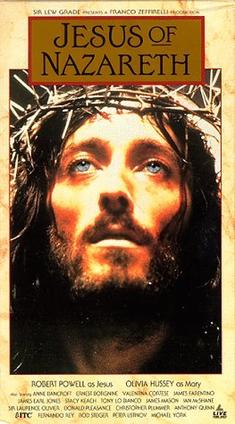- Also Known As:
- Unknown
- Year:
- 1977
- Countries:
- Predominant Genre:
- Historical
- Director:
- Outstanding Performance:

- Premiss:
- Reverent depiction of the Christian Gospels.
- Themes:
- Alienation | Christianity | Compassion | Courage | Destiny | Empathy | Friendship | God | Humanity | Identity | Loneliness | Loyalty | Mankind | Materialism | Mercy | Personal change | Redemption | Religion |
Self-expression - Similar (in Plot, Theme or Style) to:

- Review Format:
- DVD
Joy of Narcissism
Reasonably well-written and intelligent account of the life of The Christ that, while deeply traditional in its telling, manages to be fairly fresh and intriguing.
Robert POWELL offers a winning and signature performance in the role that is hard to beat. However, the exceptionally-strong cast is this tv mini-series’ partial downfall. It is more concerned with its all-star cast, big budget and interminable length (five hours cut down from eight, in this version) than honing the story to its essence. Instead, we have too many stars not given enough time to develop their roles; making them effective bit players.
There is also too much stress on the miracles, themselves, rather than the man who performs them. Yet the quality actors partly overcome this tail-wagging-the-dog nature of the drama that Jesus himself rails against - albeit in a religious context. Miracles have little value in themselves but in what they mean, symbolically, yet they are presented as if their significance derives from their effect not their intention. This partly elides the very complexity of religious discourse - that the series attempts to approach - by simplifying it for dramatic reasons. Yet, such simplicity does not sit well with the length of the material since this very length could have easily afforded a more complex retelling of such a hoary old story.
Jesus’ critique of religiosity is cleverly done in his rightly pointing-out that The sabbath was made for man, and not man for the sabbath
, so that any criticism of his good works on a Saturday by the high priests of the Sanhedrin are not only irrelevant but actually irreligious.
This could easily have been an hour even shorter and been just as good, which is a shame because it gets better toward the inevitably-tragic end. Like a delayed rail journey, we could have got there much sooner.





No comments:
Post a Comment